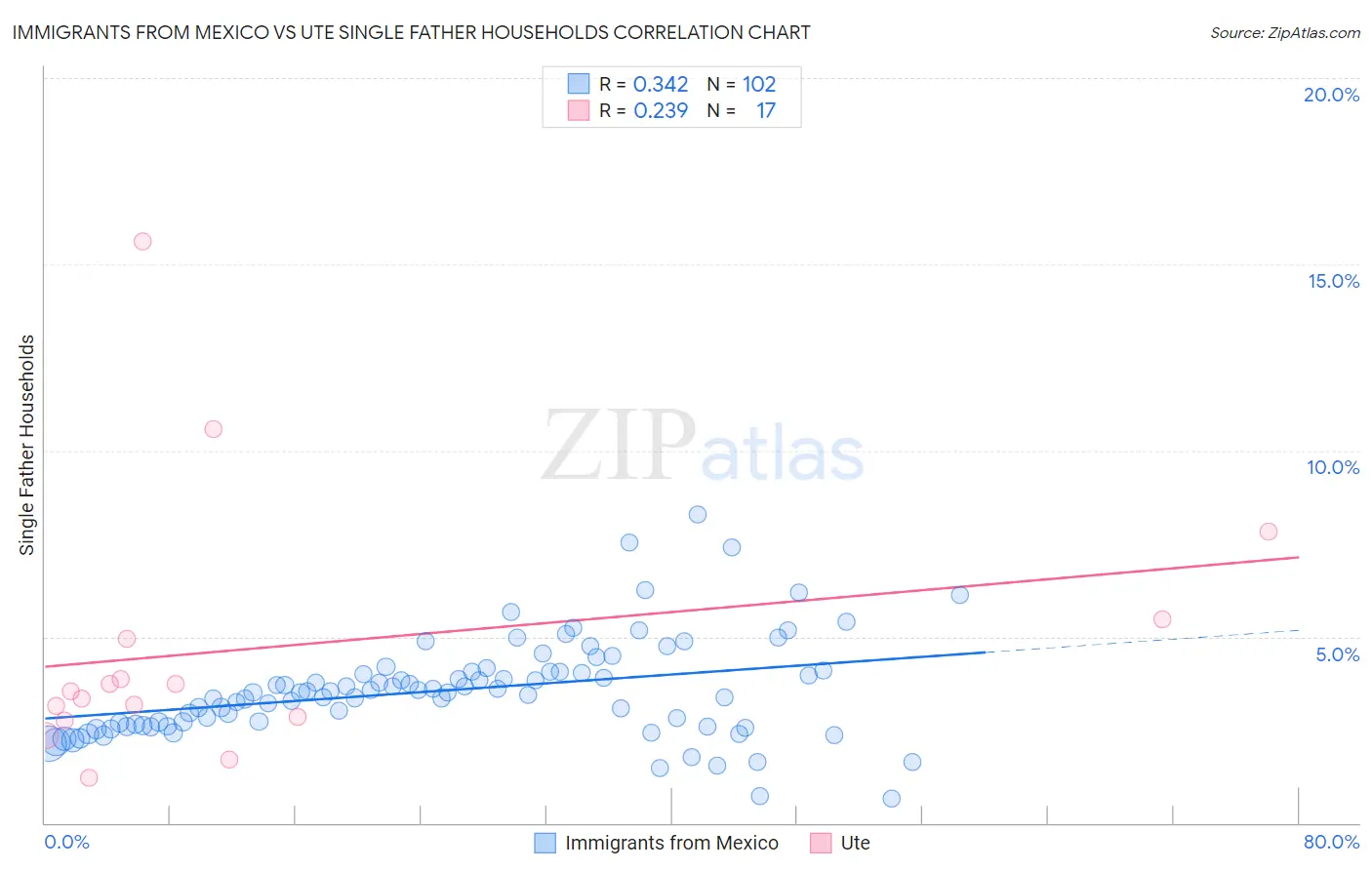Immigrants from Mexico vs Ute Single Father Households
COMPARE
Immigrants from Mexico
Ute
Single Father Households
Single Father Households Comparison
Immigrants from Mexico
Ute
3.0%
SINGLE FATHER HOUSEHOLDS
0.0/ 100
METRIC RATING
325th/ 347
METRIC RANK
3.0%
SINGLE FATHER HOUSEHOLDS
0.0/ 100
METRIC RATING
319th/ 347
METRIC RANK
Immigrants from Mexico vs Ute Single Father Households Correlation Chart
The statistical analysis conducted on geographies consisting of 505,512,983 people shows a mild positive correlation between the proportion of Immigrants from Mexico and percentage of single father households in the United States with a correlation coefficient (R) of 0.342 and weighted average of 3.0%. Similarly, the statistical analysis conducted on geographies consisting of 55,604,261 people shows a weak positive correlation between the proportion of Ute and percentage of single father households in the United States with a correlation coefficient (R) of 0.239 and weighted average of 3.0%, a difference of 2.6%.

Single Father Households Correlation Summary
| Measurement | Immigrants from Mexico | Ute |
| Minimum | 0.65% | 1.2% |
| Maximum | 8.3% | 15.6% |
| Range | 7.6% | 14.4% |
| Mean | 3.6% | 4.7% |
| Median | 3.5% | 3.5% |
| Interquartile 25% (IQ1) | 2.6% | 2.8% |
| Interquartile 75% (IQ3) | 4.1% | 5.2% |
| Interquartile Range (IQR) | 1.5% | 2.4% |
| Standard Deviation (Sample) | 1.3% | 3.6% |
| Standard Deviation (Population) | 1.3% | 3.5% |
Demographics Similar to Immigrants from Mexico and Ute by Single Father Households
In terms of single father households, the demographic groups most similar to Immigrants from Mexico are Aleut (3.0%, a difference of 0.19%), Bangladeshi (3.1%, a difference of 1.1%), Fijian (3.0%, a difference of 1.2%), Immigrants from Central America (3.0%, a difference of 1.3%), and Immigrants from Guatemala (3.0%, a difference of 1.6%). Similarly, the demographic groups most similar to Ute are Guatemalan (3.0%, a difference of 0.080%), Mexican (3.0%, a difference of 0.47%), Cape Verdean (2.9%, a difference of 0.53%), Immigrants from El Salvador (2.9%, a difference of 0.54%), and Immigrants from Guatemala (3.0%, a difference of 1.0%).
| Demographics | Rating | Rank | Single Father Households |
| Tsimshian | 0.0 /100 | #312 | Tragic 2.9% |
| Arapaho | 0.0 /100 | #313 | Tragic 2.9% |
| Salvadorans | 0.0 /100 | #314 | Tragic 2.9% |
| Cheyenne | 0.0 /100 | #315 | Tragic 2.9% |
| Houma | 0.0 /100 | #316 | Tragic 2.9% |
| Immigrants | El Salvador | 0.0 /100 | #317 | Tragic 2.9% |
| Cape Verdeans | 0.0 /100 | #318 | Tragic 2.9% |
| Ute | 0.0 /100 | #319 | Tragic 3.0% |
| Guatemalans | 0.0 /100 | #320 | Tragic 3.0% |
| Mexicans | 0.0 /100 | #321 | Tragic 3.0% |
| Immigrants | Guatemala | 0.0 /100 | #322 | Tragic 3.0% |
| Immigrants | Central America | 0.0 /100 | #323 | Tragic 3.0% |
| Fijians | 0.0 /100 | #324 | Tragic 3.0% |
| Immigrants | Mexico | 0.0 /100 | #325 | Tragic 3.0% |
| Aleuts | 0.0 /100 | #326 | Tragic 3.0% |
| Bangladeshis | 0.0 /100 | #327 | Tragic 3.1% |
| Immigrants | Cabo Verde | 0.0 /100 | #328 | Tragic 3.1% |
| Chippewa | 0.0 /100 | #329 | Tragic 3.1% |
| Nepalese | 0.0 /100 | #330 | Tragic 3.1% |
| Navajo | 0.0 /100 | #331 | Tragic 3.2% |
| Yaqui | 0.0 /100 | #332 | Tragic 3.2% |